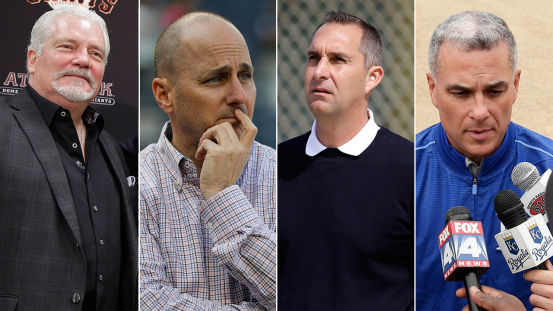- Commissioner’s statement on Ventura, Marte
- Ronnie O’Sullivan: Masters champion ‘felt so vulnerable’ in final
- Arron Fletcher Wins 2017 WSOP International Circuit Marrakech Main Event ($140,224)
- Smith challenges Warner to go big in India
- Moncada No. 1 on MLB Pipeline’s Top 10 2B Prospects list
- Braves land 2 on MLB Pipeline’s Top 10 2B Prospects list
- Kingery makes MLB Pipeline’s Top 10 2B Prospects list
- New Zealand wrap up 2-0 after Bangladesh implosion
- Mathews, Pradeep, Gunathilaka to return to Sri Lanka
- Elliott hopes for rain for Poli
Deadline near: How does your GM tick?
- Updated: July 29, 2016

Opening Day. The All-Star Game. The playoffs and the World Series. These are Major League Baseball’s crown-jewel events.
Major League general managers, though, have their private crown-jewel events, even if they are delineated. It’s the Hot Stove season and the weeks and days leading up to the annual non-waiver Trade Deadline, which this year is Monday at 4 p.m. ET.
To succeed requires research. Knowing what other teams need and what they can be convinced to part with. An unblinking assessment of your own situation. And the poker player’s insight into the psyche of each executive to be dealt with, figuring out what makes him tick.
There can be many different roads that lead to hoisting the World Series trophy. And the reality is that it’s impossible to divide all these men into neat little boxes. With that in mind, after talking to a wide range of keen baseball people, here’s an attempt to categorize each GM as the clock ticks down to Monday.
TRIED AND TRUE
Dayton Moore, Royals Moore trusts his scouts, but he isn’t afraid to make a deal in an attempt to win now — even if it means trading prospects. Last year, he gave up five touted young pitchers to obtain Johnny Cueto and Ben Zobrist, and Kansas City went on to win the World Series.
“The whole point of having a Minor League system is to use it to get better at the big league level. And that may include trading prospects,” Moore has said.
Sandy Alderson, Mets Alderson has earned a reputation for being cautious and conservative, but some of that is dictated by the fact that the team’s payroll has been relatively modest. He did demonstrate that he’d pull off a blockbuster under the right circumstances when he acquired Yoenis Cespedes for Michael Fulmer last July.
Dan Duquette, Orioles Duquette has a knack for waiting patiently for the market to settle and then getting players like Mark Trumbo, Nelson Cruz and Pedro Alvarez at advantageous prices.
“He’s old school,” said a longtime executive who knows Duquette well. “But he uses a little bit of everything. He leans more to the baseball side, but he uses analytics to his advantage and uses them very well.”
Walt Jocketty, Reds Jocketty, Cincinnati’s president of baseball operations, is approaching his final Deadline, with general manager Dick Williams scheduled to take over in 2017. Jocketty, who won seven National League Central titles and a World Series as GM of the Cardinals, has a reputation for being one of the shrewdest traders in the game. He made his mark in Cincy at last year’s Trade Deadline when he got back John Lamb, Cody Reed, Brandon Finnegan and Adam Duvall in trades of Cueto and Mike Leake.
Mike Rizzo, Nationals Rizzo’s traditional baseball roots run deep. He played in the Minors and has been a coach, scout and player-development director. Rizzo’s father, Phil, was a scout. That’s probably why he is considered one of the best talent evaluators among his peers.
NEW SCHOOL
Neal Huntington, Pirates Huntington is known for analyzing every aspect of the game down to the tiniest detail. Example: Spring Training stats for hitters are broken down by where the ball was hit, how hard it was hit and even what level of pitcher the hitter was facing at the time. With a relatively small budget to work with, Huntington tends to focus on smaller deals in the margins while balancing winning now with building for the future.
Jeff Luhnow, Astros As data-driven of an executive as you will find, and Luhnow has also been unafraid to make bold moves since arriving in December 2011. Last year, he acquired Mike Fiers and Carlos Gomez from the Brewers at the Deadline for a haul that included Josh Hader, Houston’s 2014 Minor League Pitcher and Player of the Year. Luhnow also traded for Scott Kazmir in July, Oliver Perez in August and then Ken Giles during the offseason.
John Mozeliak, Cardinals Mozeliak has a reputation for thoroughness, and that’s included a gradual evolution over the years. While he still believes in the eye test, he’s also become increasingly committed to statistical analysis. Mozeliak is almost always active at the Deadline, almost always looking for pitching and rarely gives up top prospects.
Jerry Dipoto, Mariners In his first season with the Mariners after four years with the Angels, Dipoto is known as one of baseball’s most creative executives. He’s a free thinker with a clear plan of what he wants to do, which is why there was so much turnover last offseason as Dipoto tried to make the roster more OBP- and defensive-oriented.
Matt Silverman, Rays Promoted after Andrew Friedman left for the Dodgers, Silverman has carried on the relentless data-driven approach that has allowed Tampa Bay to often stay competitive with the larger-market teams.
David Stearns, Brewers Stearns is approaching his first Deadline as a GM, but he has already established his modus operandi. He has dramatically grown Milwaukee’s research …
continue reading in source mlb.mlb.com
